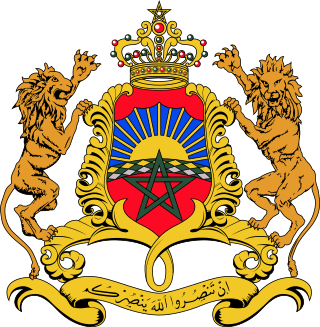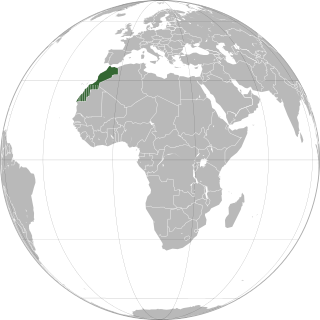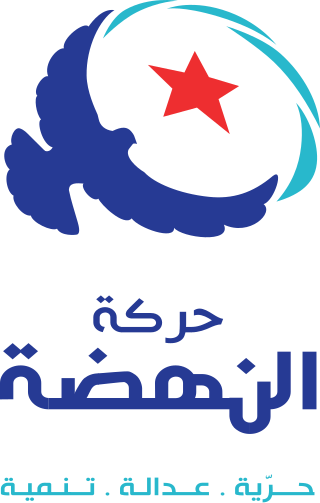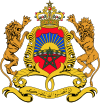
Politics of Morocco take place in a framework of an official parliamentary semi-constitutional monarchy,whereby the prime minister of Morocco is the head of government,and of a multi-party system. Executive power is exercised by the government. Legislative power is vested in both the government and the two chambers of parliament,the Assembly of Representatives of Morocco and the Assembly of Councillors. The Moroccan Constitution provides for a monarchy with a Parliament and an independent judiciary.

The 2003 Casablanca bombings,commonly known as May 16,were a series of coordinated suicide bombings on May 16,2003,in Casablanca,Morocco. Twelve suicide bombers loyal to the Salafia Jihadia organization detonated bombs hidden in backpacks in the Casa de España restaurant,the Hotel Farah,the Jewish Alliance of Casablanca,and sites near the Belgian consulate and an old Jewish cemetery. The attacks,which were later claimed by al-Qaeda,were the deadliest terrorist attacks in Morocco's history,claiming the lives of forty-five people and injuring at least 100. Despite deliberately targeting Jews,none of the victims were Jews as the attack occurred during Shabbat.

The Justice and Development Party is a political party in Morocco that advocates for Islamism. It was the ruling party of Morocco from 2011 to 2021.
Mustafa is one of the names of the Islamic prophet Muhammad,and the name means "chosen,selected,appointed,preferred",used as an Arabic given name and surname. Mustafa is a common name in the Muslim world.

Lesbian,gay,bisexual,transgender,and queer (LGBTQ) people in Morocco face significant challenges not experienced by non-LGBTQ residents.

Morocco became a highly repressive country under the absolute monarchy of King Hassan II,and continues to be considered repressive under the reign of King Mohammed VI,though the latter has instituted some reforms. Dozens of journalists,artists,and ordinary citizens are regularly sentenced to lengthy prison sentences for exercising basic rights enjoyed elsewhere in the world,such as freedom of the press,protesting the government,or criticizing government officials. Morocco heavily restricts basic human rights,such as freedom of speech,the right to assembly,and the right to criticize officials. Moroccans also feel the pressures of inflation within the country,such as the lack of basic services like healthcare,clean water,and the difficulty of parents to access quality education for their children. While there have been a handful of reforms that have been generally welcomed internationally,most Moroccans feel this is insufficient,and continue to be unhappy with the trajectory of the country under the policies of King Mohammed VI,despite his transition of the government to an ostensible constitutional monarchy. Under his father,King Hassan II,Morocco had one of the worst human rights records in Africa and the world,especially during the time period known as the "Years Of Lead",which lasted from the early 1960s until the late 1980s;it was a period in the country's history that was known for the brutal repression of political dissent and opposition,that involved wide-scale arrests,arbitrary detention,lengthy imprisonment,and even killings of political opponents. Currently,Morocco continues to face some of these issues,as well as other human rights problems,such as poor prison conditions,the mistreatment of women and the LGBT community,and the widespread use of torture by police. Despite the considerable improvements made in the last several years under the leadership of King Mohammed VI,who has rolled back some of his father's harshest decrees,repression of political dissidence,and torture of citizens by officials,is still commonplace in Morocco today.

Saadeddine Othmani,sometimes translated as Saad Eddine el-Othmani,is a Moroccan politician. He served as the 16th prime minister of Morocco from 17 March 2017 to 7 October 2021. Previously he served as foreign minister from 2012 to 2013.

Lesbian,gay,bisexual,and transgender (LGBT) people in Tunisia face legal challenges not experienced by non-LGBT residents. Both male and female kinds of same-sex sexual activity are illegal in the country. According to the United States Department of State's 2018 report on human rights in Tunisia,"authorities occasionally use [the anti-sodomy law] to detain and question persons about their sexual activities and orientation,reportedly at times based on appearance alone."

Lesbian,gay,bisexual,and transgender (LGBT) people in Malaysia face severe challenges not experienced by non-LGBT residents. Sodomy is a crime in the country,with laws enforced arbitrarily. Extrajudicial murders of LGBT people have also occurred in the country. There are no Malaysian laws that protect the LGBT community against discrimination and hate crimes. As such,the LGBT demographic in the country are hard to ascertain due to widespread fears from being ostracised and prosecuted,including violence.

The Democratic Forum for Labour and Liberties,also referred to as Ettakatol or by its French acronym FDTL,is a social democratic political party in Tunisia. It was founded on 9 April 1994 and officially recognized on 25 October 2002. Its founder and Secretary-General is the radiologist Mustapha Ben Jafar.

The Ennahda Movement,also known as the Renaissance Party or simply known as Ennahda,is a self-defined Islamic democratic political party in Tunisia.

Early general elections were held in Morocco on 25 November 2011,brought forward from 2012 and then postponed from 7 October 2011.

Abdelilah Benkirane is a Moroccan politician who was the 15th Prime Minister of Morocco from November 2011 to March 2017. After having won a plurality of seats in the 2011 parliamentary election,his party,the moderate Islamist Justice and Development Party formed a coalition with three parties that had been part of previous governments.
On 10 March 2012,Amina El Filali (1996–2012),a 16-year-old girl from Larache,Morocco,committed suicide by taking rat poison,after she was forced by her family to marry a man who had raped her when she was 15. According to Article 475 of the Moroccan penal code,the rapist was allowed to avoid prosecution by marrying his victim. This incident drew much attention to Moroccan law,and many people expressed a desire to have the law changed. Local human rights groups also called for the repeal of Article 475 of the Moroccan penal code,which de-criminalises a rape if the rapist later marries their victim. Two years after the suicide,the parliament decided to modify Article 475;it was edited in 2014.

Mustapha El Khalfi is a Moroccan politician of the Justice and Development Party. Since 3 January 2012,he holds the position of Minister of Communications and Spokesperson of the Government in Abdelilah Benkirane's government. Before this he was editor-in-chief of the Attajdid newspaper.

Fatima Ezzahra El Mansouri is a Moroccan lawyer and politician of the Authenticity and Modernity Party (PAM),and currently the mayor of Marrakesh as well as the Minister of National Planning,Urban Planning,Housing and Urban Policy.
Ḥassan al-Kettani is a Muslim scholar and former political prisoner from Morocco. Imprisoned for alleged connections to the 2003 Casablanca bombings,Kettani was pardoned by Mohammed VI eight years later after efforts by his lawyer and human rights groups,and the success of Islamists in Morocco's parliament. However many human rights groups have pointed at the fact that Shaykh Hasan was targeted due to the crackdown on Islamist scholars and activist,he was released in 2013 after years of torture and persecution.
The Daniel Galván scandal was a political scandal in which Mohammed VI,the King of Morocco,issued a pardon for a Spanish convicted serial child rapist named Daniel Galván. The Spanish citizen was serving a thirty-year prison sentence. He was arrested in Morocco in late 2011,for having raped at least eleven Moroccan children in Kenitra,a city he had been living in since 2004. The pardon came some 18 months after his incarceration as part of a diplomatic gesture from Mohammed VI to Spain,on the occasion of the 14th anniversary of his enthronement.

General elections were held in Morocco on 7 October 2016. The ruling Justice and Development Party remained the largest party,winning 125 of the 395 seats in the House of Representatives,a gain of 18 seats compared to the 2011 elections.
The Ministry of Justice of Morocco is responsible for ensuring the proper functioning of the judicial system. In addition to managing the prisons,the ministry holds authority over the central administration,that includes the following departments:













